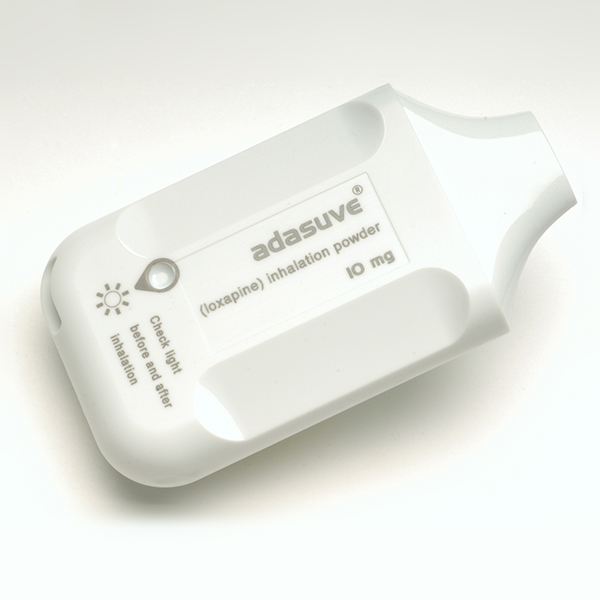Loxapine | Adasuve
ADASUVE is a typical antipsychotic indicated for the acute treatment of agitation associated with schizophrenia or bipolar I disorder in adults. Efficacy was demonstrated in 2 trials in acute agitation: one in schizophrenia and one in bipolar I disorder (1, 14) Limitations of Use: ADASUVE must be administered only in an enrolled healthcare facility (1)
Dosage and Administraion:
- Must be administered only by a healthcare professional (2.1)
- 10 mg by oral inhalation using an inhaler (2.1)
- Administer only a single dose within any 24-hour period (2.1)
- Prior to administering, screen all patients for a history of pulmonary disease, and examine patients (including chest auscultation) for respiratory abnormalities (e.g. wheezing) (2.2)
- Refer to Full Prescribing Information for important instructions on use of the ADASUVE inhaler (2.3)
- After administration, monitor patients for signs and symptoms of bronchospasm at least every 15 minutes for at least one hour (2.4)
Dosage Forms and Strengths
- Inhalation powder: 10 mg unit in a single-use inhaler (3)

—–INDICATIONS AND USAGE—–
- See description above.
—–DOSAGE AND ADMINISTRATION—–
- See description above.
—–CONTRAINDICATIONS—–
- Current diagnosis or history of asthma, chronic obstructive pulmonary disease (COPD), or other lung disease associated with bronchospasm (4)
- Acute respiratory signs/symptoms (e.g., wheezing) (4)
- Current use of medications to treat airways disease, such as asthma or COPD (4)
- History of bronchospasm following ADASUVE treatment (4)
- Known hypersensitivity to loxapine or amoxapine (4)
—–WARNINGS & PRECAUTIONS—–
- Neuroleptic Malignant Syndrome: May develop in patients treated with antipsychotic drugs. Discontinue treatment (5.4)
- Hypotension and Syncope: Use with caution in patients with known cardiovascular or cerebrovascular disease (5.5)
- Seizure: Use with caution in patients with a history of seizures or with conditions that lower the seizure threshold (5.7)
- Potential for Cognitive and Motor Impairment: Use caution when driving or operating machinery (5.8)
- Cerebrovascular Adverse Reactions: Increased incidence of stroke and transient ischemic attack in elderly patients with dementia-related psychosis treated with antipsychotic drugs (5.9)
—–ADVERSE REACTIONS—–
- Most common adverse reactions (incidence ≥ 2% and greater than placebo) were dysgeusia, sedation, and throat irritation (6.1)

